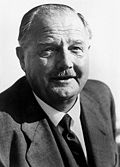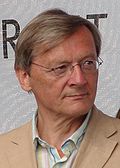| № | Portrait | Name
(Born-Died) | Term | Political Party | Government |
|---|
| Took office | Left office [a] | Duration |
|---|
State Secretariat of Industry, Commerce and Transport
(Staatsamt für Industrie, Gewerbe, Handel und Verkehr) |
|---|
| 1 | | Heinl, Eduard Eduard Heinl
(1880–1957) | 27 April 1945 | 20 December 1945 | 237 days | ÖVP | Renner IV Cabinet |
Ministry of Commerce and Reconstruction
(Bundesministerium für Handel und Wiederaufbau) |
|---|
| 2 | | Fleischacker, Eugen Eugen Fleischacker [ de ]
(1899–1953) | 20 December 1945 | 31 May 1946 | 162 days | ÖVP | Figl I Cabinet |
| (1) | | Heinl, Eduard Eduard Heinl
(1880–1957) | 31 May 1946 | 18 February 1948 | 1 year, 263 days | ÖVP | Figl I Cabinet |
| 3 | | Kolb, Ernst Ernst Kolb [ de ]
(1912–1978) | 18 February 1948 | 23 January 1952 | 3 years, 339 days | ÖVP | Figl I Cabinet–II |
| 4 | | Böck, Josef Josef C. Böck-Greissau [ de ]
(1893–1953) | 23 January 1952 | 21 April 1953 | 1 year, 88 days | ÖVP | Figl II Cabinet–II
Raab I Cabinet |
| – | | Raab, Julius Julius Raab
(1891–1964)
Acting | 21 April 1953 | 28 April 1953 | 7 days | ÖVP | Raab I Cabinet |
| 5 | | Illig, Udo Udo Illig [ de ]
(1897–1989) | 28 April 1953 | 19 September 1956 | 3 years, 144 days | ÖVP | Raab I Cabinet–II |
| 6 | | Bock, Fritz Fritz Bock
(1911–1993) | 19 September 1956 | 19 April 1966 | 9 years, 212 days | ÖVP | Raab II Cabinet–II–III
Gorbach I Cabinet–II
Klaus I Cabinet |
Ministry of Commerce and Industry
(Bundesministerium für Handel und Industrie) |
|---|
| – | | Bock, Fritz Fritz Bock
(1911–1993)
Acting | 19 April 1966 | 19 January 1968 | 1 year, 275 days | ÖVP | Klaus II Cabinet |
| 7 | | Mitterer, Otto Otto Mitterer [ de ]
(1911–1994) | 19 January 1968 | 21 April 1970 | 2 years, 92 days | ÖVP | Klaus II Cabinet |
| 8 | | Staribacher, Josef Josef Staribacher
(1921–2014) | 21 April 1970 | 24 May 1983 | 13 years, 33 days | SPÖ | Kreisky I Cabinet–II–III–IV |
| – | | Steger, Norbert Norbert Steger
(born 1944)
Acting | 24 May 1983 | 21 January 1987 | 3 years, 242 days | FPÖ | Sinowatz Cabinet
Vranitzky I Cabinet |
| 9 | | Steger, Norbert Robert Graf [ de ]
(1929–1996) | 21 January 1987 | 1 April 1987 | 70 days | ÖVP | Vranitzky II Cabinet |
Ministry of Economy
(Bundesministerium für Wirtschaft) |
|---|
| 9 | | Steger, Norbert Robert Graf [ de ]
(1929–1996) | 1 April 1987 | 24 April 1989 | 2 years, 23 days | ÖVP | Vranitzky II Cabinet |
| 10 | | Schüssel, Wolfgang Wolfgang Schüssel
(born 1945) | 24 April 1989 | 4 May 1995 | 6 years, 10 days | ÖVP | Vranitzky II Cabinet–II–III |
| 11 | | Ditz, Johannes Johannes Ditz [ de ]
(born 1951) | 4 May 1995 | 19 July 1996 | 1 year, 76 days | ÖVP | Vranitzky IV Cabinet–II |
| 12 | | Farnleitner, Johann Johann Farnleitner [ de ]
(born 1939) | 19 July 1996 | 4 February 2000 | 3 years, 200 days | ÖVP | Vranitzky V Cabinet
Klima Cabinet |
| 13 | | Bartenstein, Martin Martin Bartenstein
(born 1953) | 4 February 2000 | 1 April 2000 | 57 days | ÖVP | Schüssel I Cabinet |
Ministry of Economy and Labor
(Bundesministerium für Wirtschaft und Arbeit) |
|---|
| 13 | | Bartenstein, Martin Martin Bartenstein
(born 1953) | 1 April 2000 | 2 December 2008 | 8 years, 245 days | ÖVP | Schüssel I Cabinet–II
Gusenbauer Cabinet |
| 14 | | Mitterlehner, Reinhold Reinhold Mitterlehner
(born 1955) | 2 December 2008 | 1 February 2009 | 61 days | ÖVP | Faymann I Cabinet |
Ministry of Economy, the Family and Youth
(Bundesministerium für Wirtschaft, Familie und Jugend) |
|---|
| 14 | | Mitterlehner, Reinhold Reinhold Mitterlehner
(born 1955) | 1 February 2009 | 1 March 2014 | 5 years, 28 days | ÖVP | Faymann I Cabinet–II |
Ministry of Science, Research and Economy
(Bundesministerium für Wissenschaft, Forschung und Wirtschaft) |
|---|
| 14 | | Mitterlehner, Reinhold Reinhold Mitterlehner
(born 1955) | 1 March 2014 | 17 May 2016 | 2 years, 77 days | ÖVP | Faymann II Cabinet |
| 15 | | Mahrer, Harald Harald Mahrer [ de ]
(born 1973) | 17 May 2016 | 18 December 2017 | 1 year, 215 days | ÖVP | Kern Cabinet |
| 16 | | Schramböck, Margarete Margarete Schramböck
(born 1970) | 18 December 2017 | 8 January 2018 | 21 days | ÖVP | Kurz I Cabinet |
Ministry of Digital and Economic Affairs
(Bundesministerium für Digitalisierung und Wirtschaft) |
|---|
| 16 | | Schramböck, Margarete Margarete Schramböck
(born 1970) | 8 January 2018 | 3 June 2019 | 1 year, 146 days | ÖVP | Kurz I Cabinet |
| 17 | | Udolf, Elisabeth Elisabeth Udolf-Strobl
(born 1956) | 3 June 2019 | 7 January 2020 | 218 days | Independent | Bierlein Cabinet |
| (16) | | Schramböck, Margarete Margarete Schramböck
(born 1970) | 7 January 2020 | 11 May 2022 | 5 years, 141 days | ÖVP | Kurz II Cabinet
Schallenberg Cabinet
Nehammer Cabinet |
| 18 | | Kocher, Martin Martin Kocher
(born 1973) | 11 May 2022 | Incumbent | 3 years, 17 days | ÖVP | Nehammer Cabinet |























